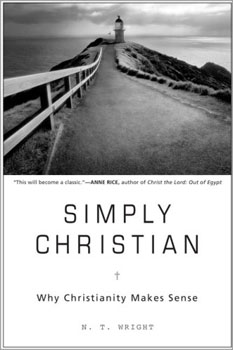
Yesterday was so close.
The only thing I needed to look fly was a pointy stick!

A scrapbook of thoughts on arts, culture and the Christian life.

Yesterday was so close.
The only thing I needed to look fly was a pointy stick!
Not long ago, I had the opportunity to spend the evening reading at the big table in Bucer’s Coffeehouse Pub. It’s one of my favorites places and it’s difficult not to eavesdrop.
Many of the student’s at New Saint Andrews classical college study here in the evenings. This night was pretty typical I believe. To my left were two young men who spoke at length about how this Easter came very early this year because of the complicated formula used to determine what Sunday it should fall on. It was noted that the Orthodox church (and the Jews) still have Easter (or Passover) coming later this year due to the fact that their calendar isn’t accurate. Apparently it doesn’t have leap-years frequent enough to keep the equinox lined up correctly.
Across the table from me was a young man working on translating a cryptic Hebrew text for one of his classes. He occasionally joined in to the discussion about the church calendar with comments about how he had recently visited an Orthodox church on his trip to the Balkans where the daily scripture reading was recited in 10 different languages to cover all the people that might be attending.
To my right was a guy reading Peter Leithart’s new book Solomon Among the Postmoderns. Well, at least he started on it. He ended up spending most of the hour surfing Facebook.
About this time, I realized that exactly 5 years ago, it was me sitting in the same chair with my sheet music spread all over the huge table. I was analyzing a Miles Davis solo transcription as the final project for Theoretical Basis of Jazz at the university. My professor at the time, Dan Bukvich, recently marked his 30th year at the music school. My wife and I contributed a story to a memory book that was being compiled for him. Wow, what a wonderful time. I miss school. Part of me envied all the guys around the table that evening.

go to work, send your kids to school
follow fashion, act normal
walk on the pavement, watch T.V.
save for your old age, obey the law
Repeat after me: I am free
I’m not sure if this if the writer meant this to be cynical or an appeal to be content.
I read it as the latter.
My 3-year-old daughter has already absorbed many indispensable pieces of knowledge from her father. An awareness of the utter coolness of robots, I am proud to say, is top on the list. This morning, without any help or prodding, she drew a wicked robot for her mom:

About a year ago, I heard a brilliant 1 hour interview with N.T. Wright about his new book Simply Christian. It’s meant to be a introduction to Christianity and a basic apologetic in the tradition of C.S. Lewis’s Mere Christianity. I’m not sure why I put this one off so long, but I finally got a hold of a copy and read through it this week.

My verdict is that Mere Christianity still quite a bit better, though Simply Christian has some very excellent sections. Just like Lewis, Wright approaches spirituality in general and then gradually brings in central Christian beliefs and finally church mechanics. In the middle section on Jesus, Lewis stays calm and concise where Wright gets a little bit too excited and tries to deal with too many things at once. Nevertheless, his chapters discussing our desire for beauty are a really excellent and an angle completely missing from Lewis’s work. His concise overview of scripture (The Book God Breathed) is also quite useful. He doesn’t get hung up on any details.
Anyway, the book is definitely worth reading, regardless of where you are on your journey to or in Christianity. It turns out all of the very best parts were quoted in the interview I originally listed to. Smart guy. This extended excerpt begins one of my favorite parts:
One day, rummaging through a dusty old attic in a small Austrian town, a collector comes across a faded manuscript containing many pages of music. It is written for the piano. Curious, he takes it to a dealer. The dealer phones a friend, who appears half an hour later. When he sees the music he becomes excited, then puzzled. This looks like the handwriting of Mozart himself, but it isn’t a well-known piece. In fact, he’s never heard it. More phone calls. More excitement. More consultations,. It really does seem to be Mozart. And, though some parts seem distantly familiar, it doesn’t correspond to anything already known in his works.
Before long, someone is sitting at a piano. The collector stands close by, not wanting to see his precious find damaged as the pianist turns the pages. But then comes a fresh surprise. Te music is wonderful. It’s just the sort of thing Mozart would have written. It’s energetic and elgiac by turns; it’s got subtle harmonic shifts, some splendid tunes, and a ringing finale. But it seems…incomplete. There are places where nothing much seems to be happening, where the piano is simply marking time. There are other places where the writing is faded and it isn’t quite clear, but it looks as though the composer has indicated, not just one or two bars rest, but a much longer pause.
Gradually the truth dawns on the excited little group. What they are looking at is indeed by Mozart. It is indeed beautiful. But it’s the piano part of a piece that involves another instrument, or perhaps other instruments. By itself it is frustratingly incomplete. A further search of the attic reveals nothing else that would provide a clue. The piano music is al there is, a signpost to something that was there once and mght still turn up one day. There must have been a complete work of art which would now, without additional sheet music, be almost impossible to reconstruct; they don’t know if the piano was to accompany an oboe or a bassoon, a violin or a cell, or perhaps a full string quartet or some other combination of instruments. If those other parts could be found, they would make complete sense of the incomplete beauty contained in the faded scribble of genius now before them.
This is the position we are in when confronted by beauty. The world is full of beauty, but the beauty is incomplete. Our puzzlement about what beauty is, what it means, and what (if anything) it is there FOR is the inevitable result of looking at one part of a larger whole. Beauty, in other words, is another echo of a voice – a voice which (from the evidence before us) might be saying one of several different things, but which, were we to hear it in all its fullness, would make sense of what we presently see ad hear and know and love and call “beautiful.”
…Beauty, like justice, slips through our fingers. We photograph the sunset, but all we get is the memory of the moment, not the moment itself. We buy the recording, but the symphony says something different when we listen to it at home. We climb the mountain, and though the view from the summit is indeed magnificent, it leaves us wanting more; even if we could build a house there and gaze all day at the scene, the itch wouldn’t go away. Indeed, the beauty sometimes seems to be in the itching itself, the sense of longing, the kind of pleasure which is exquisite and yet leaves us unsatisfied.
Wright goes on to explain how this unmet longing is actually the voice of our creator God calling to us. Goooooood stuff.
I’ve never read a philosophy book before. Really. I’ve skirted the subject with some of my interests in theology and psychology, but I’ve never jumped straight into one. With Rene Girard’s Things Hidden Since the Foundation of the World, I’ll be attempting just that.
I’ve once heard that virtually all western thought is simply a footnote to Plato, and I’m beginning to see what is meant by that quote. So much of modern thought has just assumed all these things that Plato said were true and it’s proponents start with that assumption. Unfortunately, Plato’s ideas were NOT Christian and certainly not trinitarian. The fact that we as Christians continue to hold on to his ideas about metaphysics is actually a huger barrier to our understanding the Bible.
The main Platonic idea I’m talking about of course is the idea that the soul and body are completely separate entities. The soul is immortal. Our body is dust. Our body is just a container for our soul. The soul is good, the flesh is fallen and passing away. Sound familiar? I think I’ve heard this in church before. Except that’s actually not in the Bible. Not at all. This is not the basis of a sound theology of heaven and life after death. This is not the basis for understanding the incarnation and who Jesus is. This is not the basis for our approach to the future and the end of the world. But we are so used to this idea, it’s very hard to part with it.

(Plato on the far left. Not me on the far right. Photo credit.)
In beginning this book, I’m struck by how much the author has in common with N.T. Wright. Both of them feel it necessary to beat up Plato with a big stick before they can move forward with their discussion. They see this faulty idea as being a key thing that is holding us back from growing in our understanding of eschatology and life after death (in Wright’s case) and in religion and social relations in general (in Girard’s case). Girard is also a Christian, but he approaches many of these deep theological from a completely different angle then I am used to hearing. He doesn’t start by exegeting verses from the New Testament, but instead attempts to articulate a more global theory of religion and then work gradually inside from that to Jesus and why he is such a big deal. I’m looking forward to working through this one.
Since the attempt to understand religion on the basis of philosophy has failed, we ought to try the reverse method and read philosophy in light of religion.
-Rene Girard
Referenced from The Year of Living Biblically by A.J. Jacobs. Reviewed by BWIII here.
Daniel Whitfield has made an astoundingly exhaustive study of every alcohol reference in Scripture– all 247 of them. I quote here his findings:
On the negative side:
- there are 17 warnings against abusing alcohol,
- 19 examples of people abusing alcohol,
- 3 references to selecting leaders,
- and one verse advocating abstinence if drinking will cause a brother to stumble.
- Total negative references 40, or 16%.
On the positive side:
- there are 59 references to the commonly accepted practice of drinking wine (and strong drink) with meals,
- 27 references to the abundance of wine as an example of God’s blessing,
- 20 references to the loss of wine and strong drink as an example of God’s curse,
- 25 references to the use of wine in offerings and sacrifices,
- 9 references to wine being used as a gift, and
- 5 metaphorical references to wine as a basis for a favorable comparison.
- Total positive references: 145, or 59%.
“Neutral references make up the other 25%. If I could add only one observation to Whitfield’s study: There is also one reference to medicinal alcohol: ‘No longer drink only water, but use a little wine for the sake of yopur stomach and your frequent ailments (1 Timothy 5.23).
My long and deeply thought-out conclusions: Wine is yummy! Drink it with meals and by itself! Enjoy it, just not too much. It makes for a nice gift too. Apparently God has cursed the baptists. So sad.

I was originally drawn to reading something by Anne Lamott after seeing potent quotes from her referenced in other works. Things like:
“You can safely assume that you’ve created God in your own image when it turns out that God hates all the same people you do.”
So while I was in Boston for work a few months ago, I saw her memoir Travelling Mercies for only $2 at a really fine used bookstore just off of Harvard. Now, Lamott is like no one I had ever read before: A liberal, dread-lock wearing feminist activist. I’d spent most of my life growing up in the company of conservatives who wouldn’t touch an author like this with a ten-foot pole. So here is the part where I say my eyes were opened and I gained fascinating insight into a different perspective on faith… Except that I can’t say that. Actually, I wasn’t all that impressed. Lamott is a funny and ironic writer and some of her stories from the book were enjoyable to read. I think she clearly has a handle on the fundamentals of who Jesus is and the nature of grace. Nevertheless, I tired of her frequent detailed descriptions of how bad her drinking problem was before she found Jesus. I don’t think I need to write anymore about it since this one reviewer on Amazon described it very accurately:
About midway through the book, Lamott reads a review of a lecture of hers that described her as “narcissistic”, and that, I think, hits the nail pretty much on the head. It’s not that one cannot find inspiration here, or humor, or compassion; the main difficulty in Traveling Mercies is that the essays are so consistently self-absorbed as to miss many of the lessons she could have learned were she able to get beyond herself even a little bit. So we have her chalking up as a minor miracle her being able to play the `bon vivant’ with a fellow air-traveler who happens to be of a religious and political persuasion at which she would normally have sneered; it never seems to occur to her, however, that were the shoe on the other foot (as in: “I actually talked to a feminist today, and even though she’s spreading Satan’s lies, she really wasn’t all that bad!”), the essay would have read as intolerably patronizing.
Anyway, the next book like this that comes along will need to be a little more highly recommended. There is so much to read and so little time!
One thing that I loved about N.T. Wright’s The Resurrection of the Son of God is how carefully he goes about the discussion, especially when it comes to the language he uses. Before he dives into 600 pages of history, he spends a whole chapter defining some of the words words that we use frequently. This excerpt on “history” was enourmously helpful to me. (I’ve condensed several pages into one paragraph, so this is just a quick summary):
“History” can be used to describe several different things or ideas:
First, history as an event (any old event).
Second, there is history as a particularly significant event.
Third, there is history as provable event.
Fourth, and quite different from the previous three, there is history as writing-about-events-in-the-past.
Fifth, and finally, a combination of 3 and 4: history as what modern historians can say about a topic.
Confusion between these senses has of course bedeviled this very debate about the so-called ‘historical Jesus’, the phrase being used by some to mean Jesus as he actually was (sense 1), by others to mean what was significant about Jesus (sense 2), by others to mean that which we can prove (with a lot of documentation) about Jesus, as opposed to that which we must either doubt or take on faith alone (sense 3); by others again to mean what people have written about Jesus (sense 4). Those who have take the phrase in sense 5 have often rejected the Jesus not only of that sense but, apparently, of the previous four as well.
The pseudo-gnostic historian on NPR last week was mostly interested in history in the 5th sense.
…the birth and rapid rise of the Christian Church remain an unsolved enigma for any historian who refuses to take seriously the only explanation offered by the Church itself.” (That is, that Jesus actually did rise from the dead.)
-C.F.D. Moule
This weekend (it was Easter weekend), Terry Gross on NPR interviewed a Jesus scholar. Of course he went on an on about how the resurrection didn’t actually happen, but was the hope of the early apostles “projected” on reality. Kind of a modified gnostic view. He emphasized how he didn’t like non-Christians making the question of the resurrection a dichotomy of actual vs. metaphorical. He preferred literal vs. metaphorical. See, it really did actually happen (metaphorically).
Geesh. Were do they dig these people up? There is a significant list of brilliant Christian historians and scholars who actually have an orthodox view of the resurrection, and with many good reasons behind it. But no, we can’t possibly give them air time. Only whack-jobs allowed.
I was griping about this out-loud on my way to the grocery store and my daughter pipes up in the back:
“Daddy, what’s wrong?”
“Oh, I don’t like the guy on the radio.”
“Oh. OK. Daddy, can we get a cookie?”